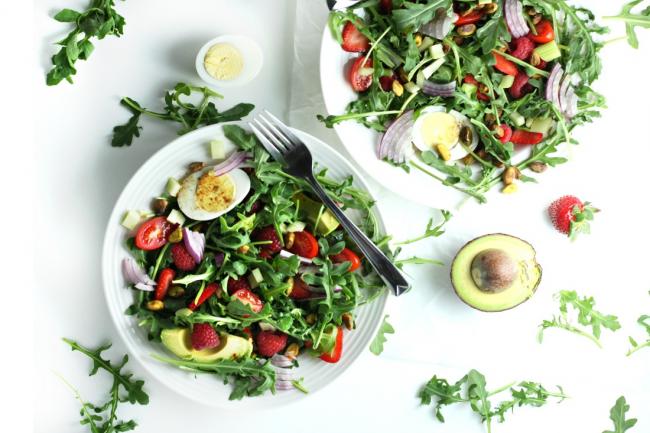You Are What You Eat: Enjoying `Eggstreme' protein
Mon, 04/18/2016
By Katy Wilkens
A friend proudly showed me the new “high protein” pancake mix she had bought. Relatively higher protein means a smaller share of the mix is carbohydrates and fat.
But is all that protein good for you? Lots of studies say no. Protein is excreted by the kidney, and when you eat a high protein diet, you make your kidneys work harder. One of the treatments for advanced chronic kidney disease is a low protein diet, to protect the kidneys. Additionally, the World Health Organization recently released a paper verifying that processed meats are carcinogenic, and that red meat is probably carcinogenic so limiting these in your diet seems wise.
The recommendation for carbohydrates is a minimum of 100 to130 grams per day. That’s three slices of bread, half a cup of pasta, a cup of starchy vegetable or two pieces of fruit. Your body needs carbs to run your brain and central nervous system. If you overeat protein at the expense of carbs, your body will break down stored protein and turn it into glucose to supply your brain and keep your blood sugar levels normal.
With fat, just like protein and carbs, more isn’t necessarily better. Fat is concentrated calories. Comparing a teaspoon of sugar, a teaspoon of protein powder and a teaspoon of oil (pure fat), the oil has more than double the calories. The best fats are found in nuts and seeds, fish and olives, and you don’t need much to make your meals satisfying and healthy.
Sounds complicated, but there is a simple way to balance out your nutrients. Fill half your plate with vegetables, have several meatless meals a week, and stick to high fiber carbs like veggies, whole grains, beans and lentils. Use small amounts of naturally occurring fats from nuts and seeds, and use butter or oil sparingly.
For most Americans, the problem isn’t too little protein or any other nutrient, it’s too much. Of all the protein-rich foods at your grocery store, eggs are the best value, and way tastier than protein powder hidden in your pancakes! Here’s a yummy way to use them.
Tangy Raspberry Salad
2 tablespoons olive oil
1/3 cup water
3/4 cup raspberry vinegar
1 tablespoon orange juice
½ teaspoon orange zest
3/4 teaspoon minced garlic
Pepper to taste
8 cups loosely packed, torn mixed salad greens
1 1/2 cups fresh or frozen raspberries
1 tablespoon chopped green onion
6 eggs
Place eggs in single layer in saucepan. Cover with at least one inch of water over the tops of the shells. Put a lid on the pot and heat. As soon as it begins to boil, remove from heat and let the eggs stand in the hot water for 15 to 17 minutes. Then drain off the hot water, immediately cover eggs with cold water and add a few ice cubes. Let eggs stand in cold water until completely cooled.
In a jar with tight-fitting lid, shake together oil, water, vinegar, orange juice, garlic and seasonings. Set aside while preparing salad.
Place salad greens in large bowl. Add raspberries, onions and quartered eggs. Shake dressing again; pour over salad. Gently toss until ingredients are evenly coated with dressing. Enjoy!
Nutrient content: (recipe serves 6)
Calories: 145
Protein: 8 grams
Sodium: 70 milligrams
The information in this column is meant for people who want to keep their kidneys healthy and blood pressure down by following a low-sodium diet. In most cases, except for dialysis patients, a diet high in potassium is thought to help lower high blood pressure. These recipes are not intended for people on dialysis without the supervision of a registered dietitian.
Katy G. Wilkens is a registered dietitian and department head at Northwest Kidney Centers. A recipient of the Susan Knapp Excellence in Education Award from the National Kidney Foundation Council on Renal Nutrition, she has a Master of Science degree in nutritional sciences from the University of Washington. See more of her recipes at www.nwkidney.org.


